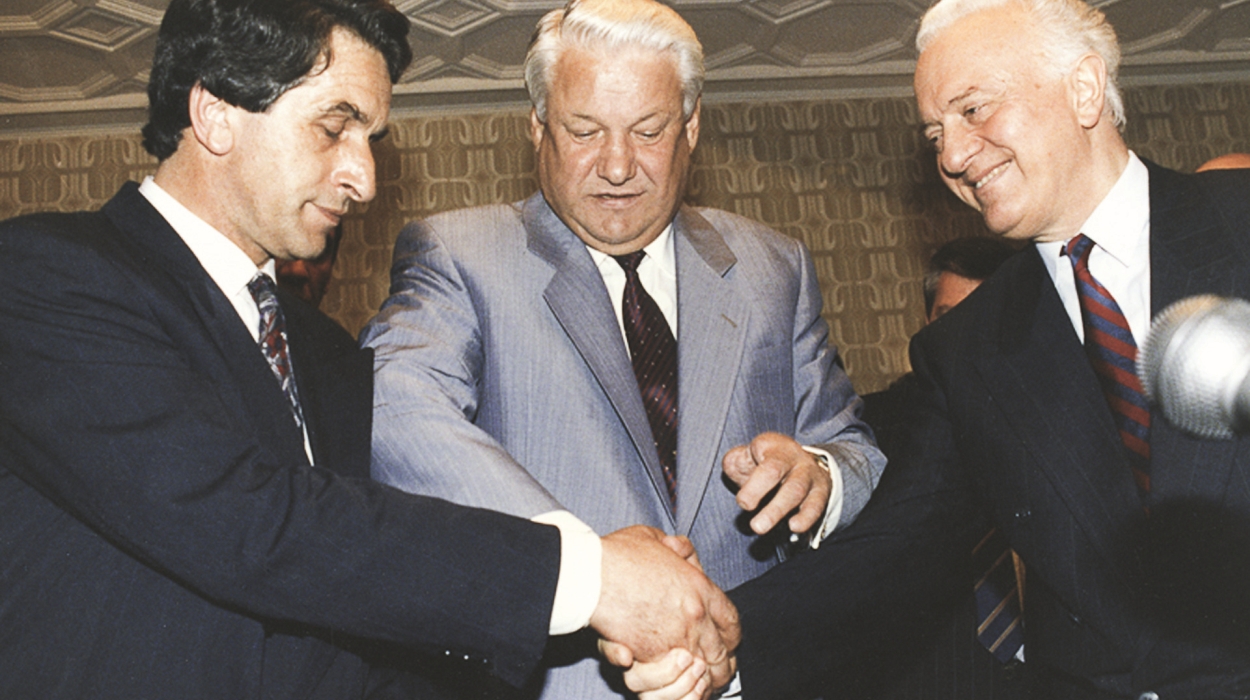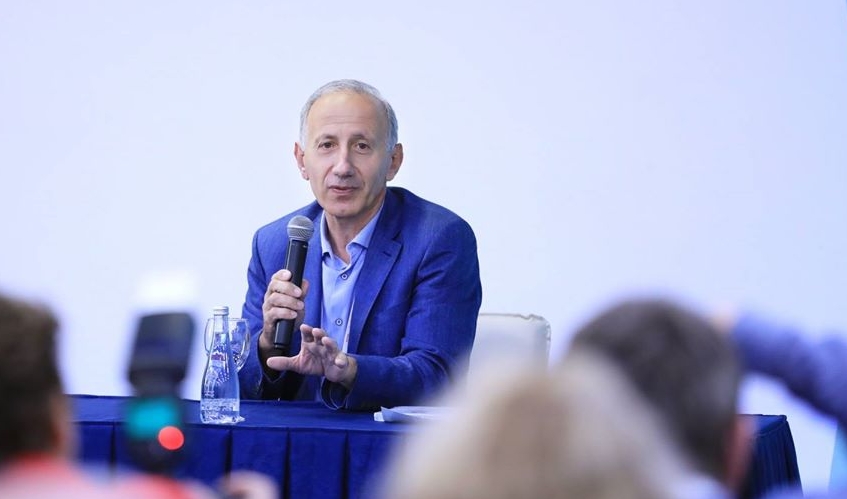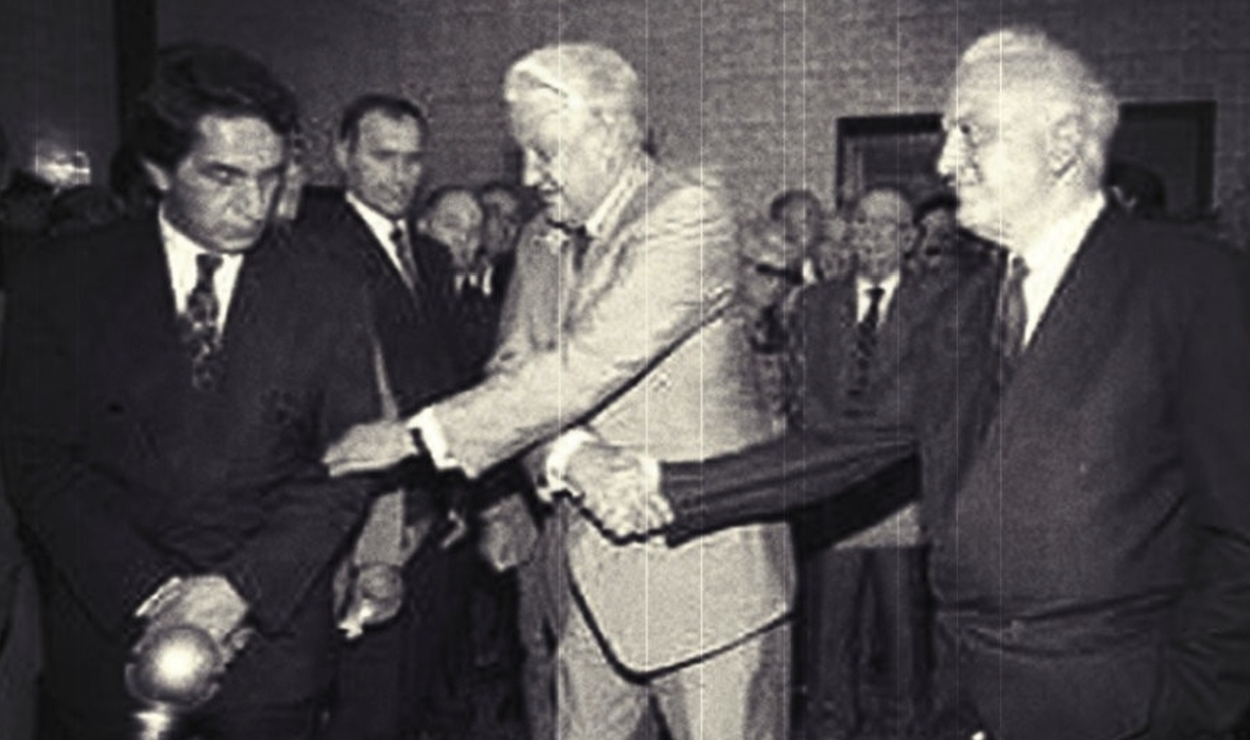How there was an attempt to stop the Georgian-Abkhazian war in Moscow’s 'President Hotel'?

Abkhaz leader Vladislav Ardzinba (left), Russian leader Boris Yeltsin and Georgian leader Eduard Shevardnadze(right).
Vitaly Sharia (Ekho-Kavkaza) -- These days Abkhazia is remembering one of the key-events of the Georgian-Abkhazian war – the meeting of the leaders of Abkhazia, Georgia and Russia thirty years ago in Moscow. Ekho Kavkaza spoke with TV journalist Ruslan Khashig, who covered the meeting.
In the middle of last month, Ruslan Khashig, chairman of the Union of Journalists of Abkhazia, told Echo of the Caucasus about how he accompanied the first president of Abkhazia, Vladislav Ardzinba, during his only visit to Tbilisi 25 years ago as a TV correspondent. And then Ruslan Mkanovich and I had an agreement that he would also share with our audience memories of how thirty years ago (again a round date) he covered another and much more famous international meeting that people recall. Then, on 3 September 1992, in Moscow’s President Hotel an attempt was made to stop the ever more heated Georgian-Abkhazian war. Officially, this was called a meeting between Russian President Boris Yeltsin and Georgian President Eduard Shevardnadze, to which the leaders of Abkhazia and the republics of the North Caucasus of the Russian Federation were invited.
First of all, Ruslan Khashig mentioned two moments that formed the mindset of many in Abkhazian society on the eve of the meeting in Moscow. Although on 18 August on the fourth day after the fatal entry of troops of the State Council of Georgia into Abkhazia, President Boris Yeltsin declared that Russia would not interfere in this armed conflict, many recalled how Moscow had stopped the bloodshed in Abkhazia just three years earlier, but out of inertia they had forgotten that then it was still the USSR, and at that time it was the USSR’s internal troops which had stood between the warring parties. And yet there existed the illusion that they would gather in Moscow, make some kind of decision, and lo! everything would end just as it had in 1989. The second moment – before the appointed day of the Moscow meeting, the Georgian troops made an attempt to break through the line of defence of the Abkhazian militia on the R. Gumista in order to come to the meeting with a greater opportunity to dictate terms. But this attempt failed, as illustrated by several burned tanks under the lower Gumista bridge.

Ruslan Khashig, chairman of the Union of Journalists of Abkhazia.
The AT film-crew flew out together with the Abkhazian delegation on a Russian government-plane sent from the Gudauta military airfield. Khashig recalls:
“I had with me cameraman Temur Kuchuberia, and then there was also a journalist Georgij Gulia, who worked at Abkhazian television ... Amiran Gamgia was in Moscow. They gave me a telephone, contacted the office of the press-secretary of the President of Russia Kostikov, and we said: ‘We still have an operator, we need to accredit him too.’ It's good that we did it – the filming-atmosphere was difficult, and the risks he took were very serious. There were a lot of cameras – it was the first time in my life that I had seen such a huge number of them. We filmed the initial footage of the meeting in the oval conference-hall, by protocol. The rest of the time we were in the hall on the second floor in the hope that we would hear, find out, something,. Already late in the evening, towards nine o'clock, the negotiators went to a briefing. They were supposed to go out into the big hall, but the journalists rushed to meet them – they could not even be stopped. We found the leaders of the delegations right at the exit from the negotiating hall. It was very difficult to shoot in such a small space as the dressing room. I remember that cameraman Temur Kuchuberia and I lifted up the camera-tripod so that the first persons were in the frame ... The journalists simply shouted: ‘Give the floor to Ardzinba, let him comment!’ The reason was that at first only Yeltsin and Shevardnadze spoke. Yeltsin spoke for a very long time. He spoke general words, and it was difficult to understand what was happening. The only thing we knew right away Because at first only Yeltsin and Shevardnadze spoke. Yeltsin spoke for a very long time. He spoke general words, and it was difficult to understand what was happening. The only thing we learned right away was that Ardzinba had refused to sign the agreement, and only at the last moment did he move to sign.”

+ "Surprise" for Shevardnadze: Results of the 1992 Moscow Agreement
+ Stanislav Lakoba: "If Yeltsin had been opposed, the war in Abkhazia would not have started"
+ Thirty Years' War. How the Georgian-Abkhazian war changed history, and history changed the war
What happened before and during the negotiations? The evening before, representatives of the Abkhazian and Georgian sides (Anri Dzhergenia, Igor Akhba and others) were trying to find some kind of consensus on a draft-agreement that had clearly been prepared at Tbilisi's dictation. It did not contain the main point for which the Abkhazians were striving – the complete withdrawal of the troops of the State Council of Georgia from Abkhazia, but it contained a condemnation of the volunteers who came to their defence, which sounded blasphemous in their ears. As a result, in the morning, the same project was offered to the negotiators without any changes ... In addition to Vladislav Ardzinba, Vazha Zarandia, Yuri Voronov, Konstantin Ozgan participated in the negotiations... The transcript of the meeting testifies to the unprecedented pressure placed on the Abkhazian delegation. Here are a couple of quotes from it:
‘President of Russia B.N. Yeltsin: The final final document of today's Moscow meeting has been worked out. We are signing this final document with the Chairman of the State Council of Georgia, Eduard Ambrosievich Shevardnadze… It is a matter of conscience and the political intuition of each of you as to what to do. That's all I wanted to say. Eduard Amvrosievich, do we agree to sign?
‘E.A. Shevardnadze: Yes.
‘B.N. Yeltsin: I sign.
‘V.G. Ardzinba: Boris Nikolaevich, maybe take your time, just a minute, and still you will listen to us. As far as I understand, the conflict is taking place in Abkhazia. Since it is the fate of Abkhazia that is being decided, perhaps, at least it is necessary simply to listen to our opinion as well.
‘B.N. Yeltsin: You expressed it. And not just once. We have listened to you more than once... And, I think, whoever does not sign will very seriously fight with his conscience for many years regarding the way he acted: “for” his people or “against” his people. There will be no more discussion today. Who does not want to sign, this is up to each individual. I would ask that this document be given to Eduard Ambrosievich immediately to sign.
‘V.G. Ardzinba: I think this is a policy of pressure through force, which in no way takes into account the interests of Abkhazia... I, Boris Nikolaevich, am surprised, after all this is an important document, and we might continue discussing it so that... There are other points too that should be taken into account.
‘B.N. Yeltsin: The President of the Russian Federation cannot afford to examine every line, where, what and how... I will stop the discussion on this, I ask you not to speak out any more. Please subscribe if you agree. Eduard Ambrosievich, have you signed?
‘E.A. Shevardnadze: I signed.
‘V.G. Ardzinba: I would ask, Boris Nikolaevich, at the risk of arousing your anger, to pay attention to the fact that this document does not even raise the question of the constitutional authorities of Abkhazia...
‘B.N. Yeltsin: No, we do not interfere in internal affairs. It's up to Georgia...
‘V.G. Ardzinba: ... By God, Boris Nikolaevich, this is unfair. I say this before God that it is unfair...’.”
The leaders of the North Caucasian republics, in different tones, began to try to persuade Ardzinba to sign the document. And further:
‘V.G. Ardzinba: Can I make one last request to you? Indeed, the moment is historic and the signing is an extremely important circumstance. I would ask, as a special courtesy, if possible, to give me half an hour to consult with the delegation again and return to this hall...
‘BN Yeltsin: 30 minutes is too much for you, maybe you can agree in 15 minutes?
‘VG Ardzinba: Possibly even in 15, the amount of time one needs for a cup of coffee.
‘BN Yeltsin: To pour champagne – 15 minutes.
‘V. G. Ardzinba: Good’.
‘After the break.
‘B.N. Yeltsin: So, the final meeting. Vladislav Grigorievich, please.
‘V.G. Ardzinba: First, we shall sign the Document. There are only two points I wanted: one as a question, the other as a suggestion. I would ask you to take these into account.
‘First. There is in this article, which refers to paragraph one, regarding the agreed level. Is it possible to define this agreed level now so that it is known?
‘Second. According to paragraph 11. “The authorities and administrations of the republics, territories and regions of the North Caucasus within the Russian Federation condemn (volunteers) and will take effective measures to suppress and prevent any actions from their territory that are at odds with the provisions of this agreement”, – I will write down my special opinion, because I cannot, either morally or legally, condemn people who came to Abkhazia to sacrifice their lives for the sake of the Abkhazian people, for the sake of all the peoples of Abkhazia, and therefore, such a formula – then either paragraph 11 must be removed or I will then simply, you will allow me, write down my dissenting opinion while signing the document regarding the 11th paragraph. I hope this is no transgression. The most important thing is that I sign the document’.
“As a result, Vladislav Ardzinba succeeded in removing this wording from the document. And during the briefing, he briefly, but succinctly, with complete silence of the hall, spoke about ‘the genocide of the Abkhazian people being carried out these days’. The media carried his words around the world. But after everything was over,” Khashig says, “telephone-calls began to come from Abkhazia from people who were discouraged by what they heard on the Vremya TV programme:
“The next call was from Gudauta. I already remember it exactly. It was Sergei Shamba, and he said that they were very outraged in Gudauta: ‘What happened there? Is it really true? How could Vladislav Grigorievich condemn the volunteers?’ I said: ‘Sergej, it can’t be – where does such information come from?’ He says: ‘The programme Time.’ Vladislav Ardzinba entered the room, asked what was going on, and I handed him the phone and told him what people were reporting. And he explained to Sergej Mironovich that, yes, there was such an attempt to condemn the volunteers, but he managed to remove this condemnation from the document. Hanging up the phone, Vladislav Grigorievich said: ‘Listen, do we really need to explain to everyone like this that we did not sign such a decision? Yeltsin often said in his speech that this would all be noted by the stenographer, and that we could meet in a month and see how the agreement is working.’
“And he asked Ruslan to go down to the second floor and try to find the transcript of the meeting.” Khasig continued:
“Walking around the conference-room, reading all the signs on the offices, I read on one - Stenographic Bureau. One of the employees was on the verge of leaving. I went up to her, introduced myself as someone from the head of the Abkhazian delegation, Vladislav Grigorievich Ardzinba, with a request to get a transcript of the meeting. She opens her briefcase, takes out two copies from there ... And she even said to me: ‘Do you see what is written at the top?’ And there it was written: ‘For official use.’ And she adds: ‘You got nothing from me.’ According to her, she was very impressed by Vladislav Grigorievich's speech at the talks. I was so happy that I rushed upstairs ...
“The next day, Ardzinba asked Georgij Q’olbaia to take a photocopy of the transcript to the great friend and brother of the Abkhazian people, the Circassian Yuri Kalmykov. Before that, he had to explain even to some Abkhazian representatives:
“‘It is impossible not to sign. There is such an atmosphere that they will blame us for all the sins.’ Principally, the Abkhazians are for the continuation of the war, against peace. And Kalmykov also said: ‘Well, how could he sign such a document?!’ And in response, Q’olbaia said: ‘I thought so too. But, look, he sent me specifically so that you can acquaint yourself with this transcript.’ When Kalmykov read the transcript, he said: ‘Thank God he signed it. He saved us all.’
September 3, 1992 | Agreement to settle the Georgian-Abkhazian conflict was signed in Moscow.
“And I told Ruslan how on the day after the Moscow meeting on the deserted beach of the Gudauta camp site Chernomorets, where the Abkhazian militias and refugees, journalists then lived, I talked about its results with one local poet. And he, clearly repeating what he heard in his environment, argued that Ardzinba should not have signed such a ‘surrender’-agreement. Oh, how many times even after that did I have to hear from all sorts of armchair-experts, who were absolutely responsible for nothing and no one, such verdicts that allowed them, probably, to consider themselves in their own eyes greater Catholics than the Pope, and greater Abkhazian patriots than Vladislav Ardzinba...
“Now, after the end of the war, which lasted more than a year, and even more so after three decades, it is abundantly clear that the Moscow meeting could not have ended with the end of hostilities. The agreement spoke about the withdrawal of Georgian troops from Abkhazia, but very vaguely, with a mention that a certain part of them would remain for the notorious protection of the railway... Just as over all the centuries, the people had to decide their destiny with steel and blood. But without that agreement, Abkhazia would simply have been driven into a corner, deprived of elementary humanitarian support.”
This interview was published by Ekho Kavkaza, and is translated from Russian.